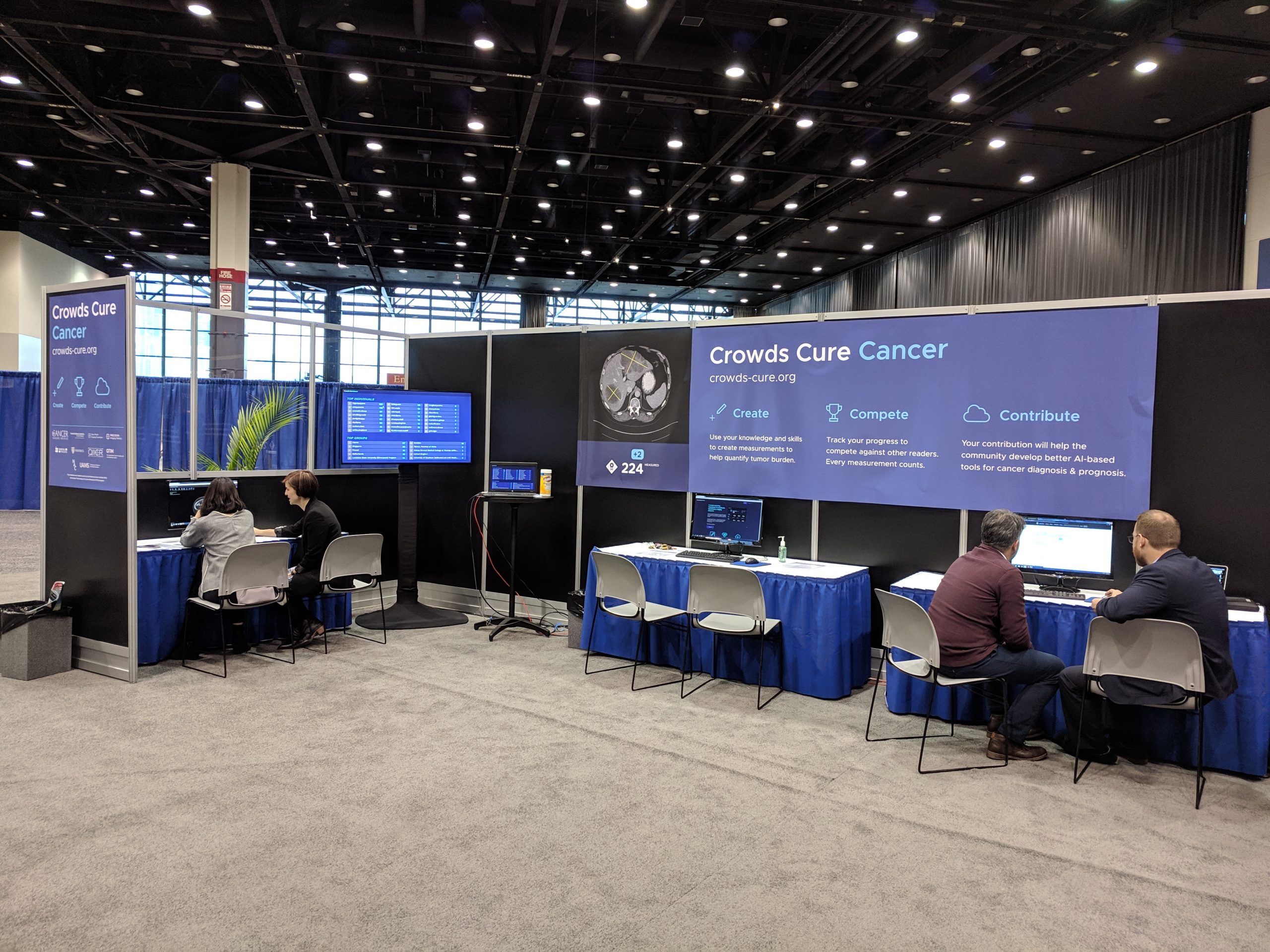
Crowds-Cure-2018 | Crowds Cure Cancer: Data collected at the RSNA 2018 annual meeting
DOI: 10.7937/TCIA.2019.yk0gm1eb | Data Citation Required | 1.2k Views | 1 Citations | Analysis Result
| Location | Subjects | Size | Updated | |||
|---|---|---|---|---|---|---|
| Bladder Endothelial Carcinoma, Colon adenocarcinoma, Glioblastoma Multiforme, Head and Neck Squamous Cell Carcinoma, Lung Squamous Cell Carcinoma, Melanoma, Non-small Cell Lung Cancer, Pancreatic Ductal Adenocarcinoma, Renal Clear Cell Carcinoma, Uterine Corpus Endometrial Carcinoma, Metastatic disease | Bladder, Brain, Colon, Head-Neck, Kidney, Lung, Pancreas, Skin, Uterine corpus | 324 | Lesion measurements | 2019/05/30 |
Summary
The Cancer Imaging Archive (TCIA) has procured substantial troves of image data, which could serve as valuable training sets for improving machine learning algorithms. However, these datasets lack consistent lesion annotations. To address this issue, the Cancer Imaging Informatics Lab at the Frederick National Laboratory for Cancer Research (FNLCR) formed a partnership with five groups funded by the National Cancer Institute’s Informatics Technology for Cancer Research program to develop a web-based crowdsourcing application for gathering lesion annotations, featured at the annual meeting of the Radiological Society of North American (RSNA). Crowds Cure Cancer (https://www.crowds-cure.org) first exhibited at RSNA 2017 utilizing CT scans from 4 different TCIA collections. Participants were asked to make a uni-dimensional measurement of the largest lesion. There were no options to provide details regarding imaging quality (e.g., no IV contrast, motion artifact, etc.), lesion location (e.g., lung, liver, etc.) or lesion characteristics (e.g., ill-defined, ground glass, etc.), requiring additional post-collection image review. The Crowds-Cure-2017 dataset can be found at DOI: 10.7937/K9/TCIA.2018.OW73VLO2. For RSNA 2018, the application was re-designed to promote more comprehensive data collection and increased community participation. Participants were instructed to identify all metastatic disease and provide details regarding image quality, lesion location and characteristics. To provide additional incentives for participation, we improved the system by adding gamification features (e.g., reward badges), and created a leaderboard to display participant standings. The amount of data being annotated was also significantly increased to include CT scans from 324 patients spanning 13 TCIA collections: Anti-PD-1_Lung, Anti-PD-1_MELANOMA, CPTAC-CCRCC, CPTAC-GBM, CPTAC-HNSCC, CPTAC-PDA, CPTAC-UCEC, NSCLC Radiogenomics, TCGA-BLCA, TCGA-COAD, TCGA-HNSC, TCGA-LUSC, TCGA-UCEC. During RSNA 2018, 4756 bi-directional measurements were obtained compared to 2345 uni-dimensional measurements in 2017. Of the 4756 measurements, 65% of the lesions were annotated with location information. The data is being released in DICOM Structured Report and CSV formats for analysis by the community. The application is available on GitHub https://github.com/crowds-cure/cancer .Description
Data Access
Some data in this collection contains images that could potentially be used to reconstruct a human face. Due to NIH Controlled Data Access Policy changes, downloads that previously required login-access are no longer available via TCIA. Watch for announcements re-enabling these in a new form.
Version 1: Updated 2019/05/30
| Title | Data Type | Format | Access Points | Subjects | License | Metadata | |||
|---|---|---|---|---|---|---|---|---|---|
| Crowd measurements | Measurement | CSV | CC BY 3.0 | — | |||||
| Structured reports | SR | DICOM and ZIP | Download requires NBIA Data Retriever |
CC BY 3.0 | — |
Collections Used In This Analysis Result
| Title | Data Type | Format | Access Points | Subjects | License | Metadata | |||
|---|---|---|---|---|---|---|---|---|---|
| Limited-access images used for annotation Includes restricted cases from cases from Anti-PD-1_MELANOMA , CPTAC-GBM , CPTAC-HNSCC , TCGA-HNSC | CT | DICOM | 68 | 119 | 243 | 52,785 | NIH Controlled Data Access Policy | View | |
| Publicly accessible images used for annotation Includes cases from Anti-PD-1_Lung , CPTAC-CCRCC , CPTAC-PDA , CPTAC-UCEC , NSCLC Radiogenomics , TCGA-BLCA , TCGA-COAD , TCGA-LUSC , TCGA-UCEC | CT | DICOM | Requires NBIA Data Retriever |
256 | 276 | 431 | 86,066 | CC BY 3.0 | View |
Citations & Data Usage Policy
Data Citation Required: Users must abide by the TCIA Data Usage Policy and Restrictions. Attribution must include the following citation, including the Digital Object Identifier:
Data Citation |
|
|
Urban, T., Ziegler, E., Pieper, S., Kirby, J., Rukas, D., Beardmore, B., Somarouthu, B., Ozkan, E., Lelis, G., Fevrier-Sullivan, B., Nandekar, S., Beers, A., Jaffe, C., Freymann, J., Clunie, D., Harris, G. J., & Kalpathy-Cramer, J. (2019). Crowds Cure Cancer: Crowdsourced data collected at the RSNA 2018 annual meeting [Data set]. The Cancer Imaging Archive. https://doi.org/10.7937/TCIA.2019.yk0gm1eb |
Detailed Description
Data resulting from this experiment is available in the following formats:
- Source DICOM scans annotated by participants
- CSV representation of crowd measurements
- DICOM-SR representation of crowd measurements
Related Publications
Publications by the Dataset Authors
The authors recommended the following as the best source of additional information about this dataset:
Research Community Publications
TCIA maintains a list of publications that leveraged this dataset. If you have a manuscript you’d like to add please contact TCIA’s Helpdesk.
